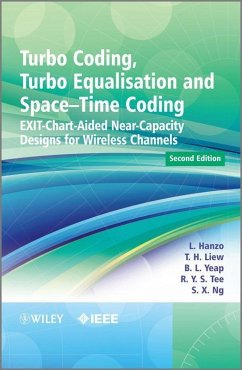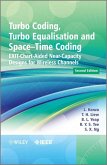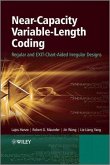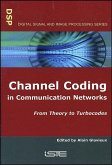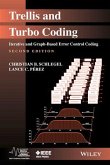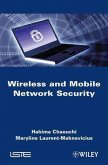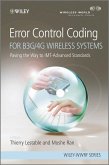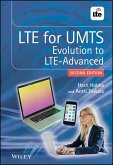Turbo Coding, Turbo Equalisation and Space-Time Coding (eBook, ePUB)
EXIT-Chart-Aided Near-Capacity Designs for Wireless Channels


Alle Infos zum eBook verschenken

Turbo Coding, Turbo Equalisation and Space-Time Coding (eBook, ePUB)
EXIT-Chart-Aided Near-Capacity Designs for Wireless Channels
- Format: ePub
- Merkliste
- Auf die Merkliste
- Bewerten Bewerten
- Teilen
- Produkt teilen
- Produkterinnerung
- Produkterinnerung

Hier können Sie sich einloggen

Bitte loggen Sie sich zunächst in Ihr Kundenkonto ein oder registrieren Sie sich bei bücher.de, um das eBook-Abo tolino select nutzen zu können.
Covering the full range of channel codes from the most conventional through to the most advanced, the second edition of Turbo Coding, Turbo Equalisation and Space-Time Coding is a self-contained reference on channel coding for wireless channels. The book commences with a historical perspective on the topic, which leads to two basic component codes, convolutional and block codes. It then moves on to turbo codes which exploit iterative decoding by using algorithms, such as the Maximum-A-Posteriori (MAP), Log-MAP and Soft Output Viterbi Algorithm (SOVA), comparing their performance. It also…mehr
- Geräte: eReader
- mit Kopierschutz
- eBook Hilfe
- Größe: 27.37MB
![Turbo Coding, Turbo Equalisation and Space-Time Coding (eBook, PDF) Turbo Coding, Turbo Equalisation and Space-Time Coding (eBook, PDF)]() Lajos L. HanzoTurbo Coding, Turbo Equalisation and Space-Time Coding (eBook, PDF)134,99 €
Lajos L. HanzoTurbo Coding, Turbo Equalisation and Space-Time Coding (eBook, PDF)134,99 €![Near-Capacity Variable-Length Coding (eBook, ePUB) Near-Capacity Variable-Length Coding (eBook, ePUB)]() Lajos L. HanzoNear-Capacity Variable-Length Coding (eBook, ePUB)114,99 €
Lajos L. HanzoNear-Capacity Variable-Length Coding (eBook, ePUB)114,99 €![Channel Coding in Communication Networks (eBook, ePUB) Channel Coding in Communication Networks (eBook, ePUB)]() Channel Coding in Communication Networks (eBook, ePUB)215,99 €
Channel Coding in Communication Networks (eBook, ePUB)215,99 €![Trellis and Turbo Coding (eBook, ePUB) Trellis and Turbo Coding (eBook, ePUB)]() Christian B. SchlegelTrellis and Turbo Coding (eBook, ePUB)131,99 €
Christian B. SchlegelTrellis and Turbo Coding (eBook, ePUB)131,99 €![Wireless and Mobile Network Security (eBook, ePUB) Wireless and Mobile Network Security (eBook, ePUB)]() H. ChaouchiWireless and Mobile Network Security (eBook, ePUB)314,99 €
H. ChaouchiWireless and Mobile Network Security (eBook, ePUB)314,99 €![Error Control Coding for B3G/4G Wireless Systems (eBook, ePUB) Error Control Coding for B3G/4G Wireless Systems (eBook, ePUB)]() Error Control Coding for B3G/4G Wireless Systems (eBook, ePUB)98,99 €
Error Control Coding for B3G/4G Wireless Systems (eBook, ePUB)98,99 €![LTE for UMTS (eBook, ePUB) LTE for UMTS (eBook, ePUB)]() Harri HolmaLTE for UMTS (eBook, ePUB)95,99 €
Harri HolmaLTE for UMTS (eBook, ePUB)95,99 €-
-
-
Dieser Download kann aus rechtlichen Gründen nur mit Rechnungsadresse in A, B, BG, CY, CZ, D, DK, EW, E, FIN, F, GR, HR, H, IRL, I, LT, L, LR, M, NL, PL, P, R, S, SLO, SK ausgeliefert werden.
- Produktdetails
- Verlag: John Wiley & Sons
- Seitenzahl: 676
- Erscheinungstermin: 3. Mai 2011
- Englisch
- ISBN-13: 9780470978337
- Artikelnr.: 37301300
- Verlag: John Wiley & Sons
- Seitenzahl: 676
- Erscheinungstermin: 3. Mai 2011
- Englisch
- ISBN-13: 9780470978337
- Artikelnr.: 37301300
1 Historical Perspective, Motivation and Outline. 1.1 A Historical
Perspective on Channel Coding. 1.2 Motivation for this Book. 1.3
Organisation of the Book. 1.4 NovelContributions of the Book. 2
Convolutional Channel Coding. 2.1 Brief Channel Coding History. 2.2
Convolutional Encoding. 2.3 State and Trellis Transitions. 2.4 The Viterbi
Algorithm. 2.5 Summary and Conclusions. 3 Soft Decoding and Performance of
BCH Codes. 3.1 Introduction. 3.2 BCH codes. 3.3 Trellis Decoding. 3.4
Soft-input Algebraic Decoding. 3.5 Summary and Conclusions. Part I Turbo
Convolutional and Turbo Block Coding. 4 Turbo Convolutional Coding (J. P.
Woodard and L. Hanzo). 4.1 Introduction. 4.2 Turbo Encoder. 4.3 Turbo
Decoder. 4.4 Turbo-coded BPSK Performance over Gaussian Channels. 4.5 Turbo
Coding Performance over Rayleigh Channels. 4.6 Summary and Conclusions. 5
Turbo BCH Coding. 5.1 Introduction. 5.2 Turbo Encoder. 5.3 Turbo Decoder.
5.4 Turbo Decoding Example. 5.5 MAP Algorithm for Extended BCH Codes. 5.6
Simulation Results. 5.7 Summary and Conclusions. Part II Space-time Block
and Space-time Trellis Coding. 6 Space-time Block Codes. 6.1 Classification
of Smart Antennas. 6.2 Introduction to Space-time Coding. 6.3 Background.
6.4 Space-time Block Codes. 6.5 Channel-coded Space-time Block Codes. 6.6
Performance Results. 6.7 Summary and Conclusions. 7 Space-time Trellis
Codes. 7.1 Introduction. 7.2 Space-time Trellis Codes. 7.3 Space-time-coded
Transmission over Wideband Channels. 7.4 Simulation Results. 7.5
Space-time-coded Adaptive Modulation for OFDM. 7.6 Summary and Conclusions.
8 Turbo-coded Adaptive Modulation versus Space-time Trellis Codes for
Transmission over Dispersive Channels. 8.1 Introduction. 8.2 System
Overview. 8.3 Simulation Parameters. 8.4 Simulation Results. 8.5 Summary
and Conclusions. Part III Turbo Equalisation. 9 Turbo-coded
Partial-response Modulation. 9.1 Motivation. 9.2 The Mobile Radio Channel.
9.3 Continuous Phase Modulation Theory. 9.4 Digital Frequency Modulation
Systems. 9.5 State Representation. 9.6 Spectral Performance. 9.7
Construction of Trellis-based Equaliser States. 9.8 Soft-output GMSK
Equaliser and Turbo Coding. 9.9 Summary and Conclusions. 10 Turbo
Equalisation for Partial-response Systems. 10.1 Motivation. 10.2 Principle
of Turbo Equalisation Using Single/Multiple Decoder(s). 10.3
Soft-in/Soft-out Equaliser for Turbo Equalisation. 10.4 Soft-in/Soft-out
Decoder for Turbo Equalisation. 10.5 Turbo Equalisation Example. 10.6
Summary of Turbo Equalisation. 10.7 Performance of Coded GMSK Systems Using
Turbo Equalisation. 10.8 Discussion of Results. 10.9 Summary and
Conclusions. 11 Comparative Study of Turbo Equalisers. 11.1 Motivation.
11.2 SystemOverview. 11.3 Simulation Parameters. 11.4 Results and
Discussion. 11.5 Non-iterative Joint Channel Equalisation and Decoding.
11.6 Summary and Conclusions. 12 Reduced-complexity Turbo Equaliser. 12.1
Motivation. 12.2 Complexity of the Multilevel Full-response Turbo
Equaliser. 12.3 System Model. 12.4 In-phase/Quadrature-phase Equaliser
Principle. 12.5 Overview of the Reduced-complexity Turbo Equaliser. 12.6
Complexity of the In-phase/Quadrature-phase Turbo Equaliser. 12.7 System
Parameters. 12.8 System Performance. 12.9 Summary and Conclusions. 13 Turbo
Equalisation for Space-time Trellis-coded Systems. 13.1 Introduction. 13.2
System Overview. 13.3 Principle of In-phase/Quadrature-phase Turbo
Equalisation. 13.4 Complexity Analysis. 13.5 Results and Discussion. 13.6
Summary and Conclusions. Part IV Coded and Space-time-Coded Adaptive
Modulation: TCM, TTCM, BICM, BICM-ID and MLC. 14 Coded Modulation Theory
and Performance. 14.1 Introduction. 14.2 Trellis-coded Modulation. 14.3 The
Symbol-based MAP Algorithm. 14.4 Turbo Trellis-coded Modulation. 14.5
Bit-interleaved Coded Modulation. 14.6 Bit-interleaved Coded Modulation
Using Iterative Decoding. 14.7 Coded Modulation Performance. 14.8
Near-capacity Turbo Trellis-coded Modulation Design Based on EXIT Charts
and Union Bounds. 14.9 Summary and Conclusions. 15 Multilevel Coding
Theory. 15.1 Introduction. 15.2 Multilevel Coding. 15.3 Bit-interleaved
Coded Modulation. 15.4 Bit-interleaved Coded Modulation Using Iterative
Decoding. 15.5 Conclusion. 16 MLC Design Using EXIT Analysis. 16.1
Introduction. 16.2 Comparative Study of Coded Modulation Schemes. 16.3
EXIT-chart Analysis. 16.4 Precoder-aided MLC. 16.5 Chapter Conclusions. 17
Sphere Packing-aided Space-time MLC/BICMDesign. 17.1 Introduction. 17.2
Space-time Block Code. 17.3 Orthogonal G2 Design Using Sphere Packing. 17.4
Iterative Demapping for Sphere Packing. 17.5 STBC-SP-MLC. 17.6
STBC-SP-BICM. 17.7 Chapter Conclusions. 18 MLC/BICMSchemes for theWireless
Internet. 18.1 Introduction. 18.2 Multilevel Generalised Low-density
Parity-check Codes. 18.3 An Iterative Stopping Criterion for MLC-GLDPCs.
18.4 Coding for theWireless Internet. 18.5 LT-BICM-ID Using LLR Packet
Reliability Estimation. 18.6 Chapter Conclusions. 19 Near-capacity
Irregular BICM-ID Design. 19.1 Introduction. 19.2 Irregular Bit-interleaved
Coded Modulation Schemes. 19.3 EXIT-chart Analysis. 19.4 Irregular
Components. 19.5 Simulation Results. 19.6 Chapter Conclusions. 20 Summary
and Conclusions. 20.1 Summary of the Book. 20.2 Future Work. 20.3
Concluding Remarks. Bibliography. Subject Index. Author Index.
1 Historical Perspective, Motivation and Outline. 1.1 A Historical
Perspective on Channel Coding. 1.2 Motivation for this Book. 1.3
Organisation of the Book. 1.4 NovelContributions of the Book. 2
Convolutional Channel Coding. 2.1 Brief Channel Coding History. 2.2
Convolutional Encoding. 2.3 State and Trellis Transitions. 2.4 The Viterbi
Algorithm. 2.5 Summary and Conclusions. 3 Soft Decoding and Performance of
BCH Codes. 3.1 Introduction. 3.2 BCH codes. 3.3 Trellis Decoding. 3.4
Soft-input Algebraic Decoding. 3.5 Summary and Conclusions. Part I Turbo
Convolutional and Turbo Block Coding. 4 Turbo Convolutional Coding (J. P.
Woodard and L. Hanzo). 4.1 Introduction. 4.2 Turbo Encoder. 4.3 Turbo
Decoder. 4.4 Turbo-coded BPSK Performance over Gaussian Channels. 4.5 Turbo
Coding Performance over Rayleigh Channels. 4.6 Summary and Conclusions. 5
Turbo BCH Coding. 5.1 Introduction. 5.2 Turbo Encoder. 5.3 Turbo Decoder.
5.4 Turbo Decoding Example. 5.5 MAP Algorithm for Extended BCH Codes. 5.6
Simulation Results. 5.7 Summary and Conclusions. Part II Space-time Block
and Space-time Trellis Coding. 6 Space-time Block Codes. 6.1 Classification
of Smart Antennas. 6.2 Introduction to Space-time Coding. 6.3 Background.
6.4 Space-time Block Codes. 6.5 Channel-coded Space-time Block Codes. 6.6
Performance Results. 6.7 Summary and Conclusions. 7 Space-time Trellis
Codes. 7.1 Introduction. 7.2 Space-time Trellis Codes. 7.3 Space-time-coded
Transmission over Wideband Channels. 7.4 Simulation Results. 7.5
Space-time-coded Adaptive Modulation for OFDM. 7.6 Summary and Conclusions.
8 Turbo-coded Adaptive Modulation versus Space-time Trellis Codes for
Transmission over Dispersive Channels. 8.1 Introduction. 8.2 System
Overview. 8.3 Simulation Parameters. 8.4 Simulation Results. 8.5 Summary
and Conclusions. Part III Turbo Equalisation. 9 Turbo-coded
Partial-response Modulation. 9.1 Motivation. 9.2 The Mobile Radio Channel.
9.3 Continuous Phase Modulation Theory. 9.4 Digital Frequency Modulation
Systems. 9.5 State Representation. 9.6 Spectral Performance. 9.7
Construction of Trellis-based Equaliser States. 9.8 Soft-output GMSK
Equaliser and Turbo Coding. 9.9 Summary and Conclusions. 10 Turbo
Equalisation for Partial-response Systems. 10.1 Motivation. 10.2 Principle
of Turbo Equalisation Using Single/Multiple Decoder(s). 10.3
Soft-in/Soft-out Equaliser for Turbo Equalisation. 10.4 Soft-in/Soft-out
Decoder for Turbo Equalisation. 10.5 Turbo Equalisation Example. 10.6
Summary of Turbo Equalisation. 10.7 Performance of Coded GMSK Systems Using
Turbo Equalisation. 10.8 Discussion of Results. 10.9 Summary and
Conclusions. 11 Comparative Study of Turbo Equalisers. 11.1 Motivation.
11.2 SystemOverview. 11.3 Simulation Parameters. 11.4 Results and
Discussion. 11.5 Non-iterative Joint Channel Equalisation and Decoding.
11.6 Summary and Conclusions. 12 Reduced-complexity Turbo Equaliser. 12.1
Motivation. 12.2 Complexity of the Multilevel Full-response Turbo
Equaliser. 12.3 System Model. 12.4 In-phase/Quadrature-phase Equaliser
Principle. 12.5 Overview of the Reduced-complexity Turbo Equaliser. 12.6
Complexity of the In-phase/Quadrature-phase Turbo Equaliser. 12.7 System
Parameters. 12.8 System Performance. 12.9 Summary and Conclusions. 13 Turbo
Equalisation for Space-time Trellis-coded Systems. 13.1 Introduction. 13.2
System Overview. 13.3 Principle of In-phase/Quadrature-phase Turbo
Equalisation. 13.4 Complexity Analysis. 13.5 Results and Discussion. 13.6
Summary and Conclusions. Part IV Coded and Space-time-Coded Adaptive
Modulation: TCM, TTCM, BICM, BICM-ID and MLC. 14 Coded Modulation Theory
and Performance. 14.1 Introduction. 14.2 Trellis-coded Modulation. 14.3 The
Symbol-based MAP Algorithm. 14.4 Turbo Trellis-coded Modulation. 14.5
Bit-interleaved Coded Modulation. 14.6 Bit-interleaved Coded Modulation
Using Iterative Decoding. 14.7 Coded Modulation Performance. 14.8
Near-capacity Turbo Trellis-coded Modulation Design Based on EXIT Charts
and Union Bounds. 14.9 Summary and Conclusions. 15 Multilevel Coding
Theory. 15.1 Introduction. 15.2 Multilevel Coding. 15.3 Bit-interleaved
Coded Modulation. 15.4 Bit-interleaved Coded Modulation Using Iterative
Decoding. 15.5 Conclusion. 16 MLC Design Using EXIT Analysis. 16.1
Introduction. 16.2 Comparative Study of Coded Modulation Schemes. 16.3
EXIT-chart Analysis. 16.4 Precoder-aided MLC. 16.5 Chapter Conclusions. 17
Sphere Packing-aided Space-time MLC/BICMDesign. 17.1 Introduction. 17.2
Space-time Block Code. 17.3 Orthogonal G2 Design Using Sphere Packing. 17.4
Iterative Demapping for Sphere Packing. 17.5 STBC-SP-MLC. 17.6
STBC-SP-BICM. 17.7 Chapter Conclusions. 18 MLC/BICMSchemes for theWireless
Internet. 18.1 Introduction. 18.2 Multilevel Generalised Low-density
Parity-check Codes. 18.3 An Iterative Stopping Criterion for MLC-GLDPCs.
18.4 Coding for theWireless Internet. 18.5 LT-BICM-ID Using LLR Packet
Reliability Estimation. 18.6 Chapter Conclusions. 19 Near-capacity
Irregular BICM-ID Design. 19.1 Introduction. 19.2 Irregular Bit-interleaved
Coded Modulation Schemes. 19.3 EXIT-chart Analysis. 19.4 Irregular
Components. 19.5 Simulation Results. 19.6 Chapter Conclusions. 20 Summary
and Conclusions. 20.1 Summary of the Book. 20.2 Future Work. 20.3
Concluding Remarks. Bibliography. Subject Index. Author Index.
